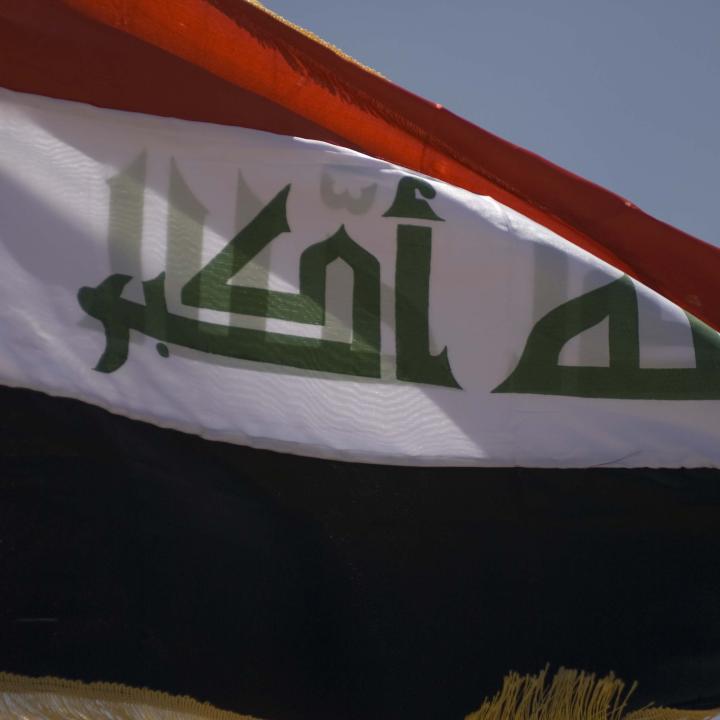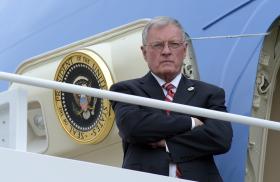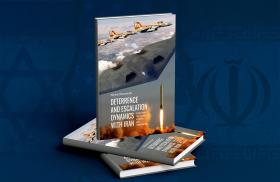
- Policy Analysis
- Fikra Forum
Iraqis Are Increasingly Positive on Governance, but Waning National Identity a Warning Sign

With signs of fewer Iraqis prioritizing their national identity, Iraqis are likely to see another elections cycle shaped by subnational identities in the upcoming parliamentary elections.
Since the fall of the Saddam Hussein regime, the Iraqi government has had a fraught relationship with many of its citizens, with distrust in governmental performance or the institution itself spilling over into both protest and violence. As Iraq heads into its next elections cycle, conflicting attitudes are emerging in Iraqi public opinion—overall, Iraqis are increasingly positive about the national government and satisfied with its performance. Yet these same opinion polls show a potentially worrying trend: approximately half of Iraqis identify with their subnational identities, particularly their ethnicity or sect of Islam, over their identity as an Iraqi national. In past iterations of this trend question, a shift towards identification with sectarian identities has correlated with unrest or conflict, and so any signs of discontent should be closely monitored in the lead-up to elections.
The Iraq Opinion Thermometer
The Iraqi Opinion Thermometer (IOT) polling effort has tracked public attitudes that are fundamental to the stability of democracy in Iraq. IOT was developed by the authors in early 2021 to systematically track the social foundations necessary for Iraq to function as a liberal democracy. Every six months, the questionnaire measures Iraqis' opinions on five main indicators that collectively reflect the state of politics in Iraq via a random probability sample (PPS) survey representing all segments of society. These surveys are conducted using computer-assisted face-to-face interviews (CAPI) by research teams at the Independent Research Group (IIACSS) in the homes of respondents in all Iraqi governorates, and include both rural and urban demographics.
The IOT measures the attitudes held by Iraqis that we judge foundational to maintaining democratic stability in Iraq. One important measure is life satisfaction—the more a citizen is satisfied with her or his life, the more likely they are to support the prevailing political status quo. Other important measures include citizens’ assessments of democratic performance as well as the efficacy of ruling elite governance in the country. The final two measures that are included in the IOT data collection effort are the level of sectarian thinking in the population and how much Iraqis identify as Iraqis above all relative to subnational and transnational identities.
The IOT uses a series of survey questions to create an index average across the five sub-metrics identified as correlated with attitudes towards the stability of democracy in Iraq. The closer the overall IOT score is to 4, the more likely Iraq’s democracy is supported by its citizens. If we compare the IOT results from the first wave in March 2021 to the latest wave in January of 2025, the overall attitudinal foundation for Iraqi democratic stability has improved slightly, with the overall IOT score in 2021 averaging 2.3 out of 4 compared to 2.5 out of 4 in 2025.
This increase is driven by growing positivity towards "governance" indicators beginning in mid-2023, during Prime Minister Shia al-Sudani’s current term. Whether in terms of trust in the government, evaluation of the prime minister's performance, or the way he operates, there have been clear positive trends expressed by Iraqis during this period. For example, the percentage of those who express confidence in the central government rose from 26% at the beginning of 2022 (prior to Sudani’s election) to 54% now. The percentage of those who say the security situation is somewhat or very good also rose significantly—from 22% to 70%, and the percentage of those who say Iraq is heading in the right direction jumped from 18% to 53% over the same period. However, one caveat and potential warning sign comes from shifting attitudes towards national identity. 53% of Iraqis now prioritize their sub-identities (religious, ethnic, sectarian, etc.) over their broader Iraqi identity.
The question of “how do you prefer to identify yourself” has been closely linked to the health of the political and social situation in Iraq since it was first asked in IIACSS’s national polling. At the beginning of 2004, when sectarian war first loomed, less than a quarter of Iraqis described themselves as "Iraqis first and foremost." And while this percentage rose to two-thirds after the defeat of al-Qaeda, it again dipped into the minority during 2012 as ISIS began to occupy large areas of Iraq. After Iraq was liberated from ISIS, the sense of national identity rose again, reaching 58% of Iraqis saying in mid-2022 that they felt Iraqi above all. However, the national identity index fell again at the beginning of this year. The main factor driving this decline in a sense of national identity is that Iraqi media, which is largely organized along sectarian and ethnic lines, has been speaking in increasingly sectarian language in the last year. Competition for viewers incentivizes Iraqi media companies to try to draw in viewers with issues that they know will play on their emotions. Sectarian competition in Iraq has traditionally been an issue to mobilize the countries different communities.
These attitudes also differ by group; 60% of Sunni Arabs say their Iraqi identity is first and foremost versus 52% of Shia Arabs. It should be noted here that the percentage of Sunni Arabs who chose a unified national identity was only 40% in 2007, compared to more than 60% for Shia Arabs—while the large majority of Kurds continue to emphasize Kurdish identity overall. The lack of an Iraqi identity among most Kurds has led to calls for independence or greater autonomy among many Iraqi Kurds, but also a corresponding frustration with what the KRG has been able to deliver on a regional level—as evidenced by the most recent Kurdish elections.
The phenomenon of divergent opinions on various issues—both governmental and otherwise—can also be traced to Iraqis’ ethnic and sectarian affiliations. This is characterized by a major shift in the opinion of Iraqi communities that began in 2017, where the once pessimistic Sunni Arab community has become increasingly accepting of the political status quo in Iraq, while Shia Arabs—theoretically the political as well as demographic majority in the country—have become increasingly disillusioned with their political position alongside Kurds. Previously, during the immediate post-Saddam period of 2003-2017, Sunni Arabs stood in contrast to the general trend of positivity, optimism, and satisfaction with the way the country is governed expressed by the majority of Kurds and Shia Arabs.
The period following the liberation of Mosul from ISIS has witnessed a complete reversal, with Sunnis becoming more optimistic and positive in their opinions compared to Shia Arabs and Kurds, who have shown a clear decline in satisfaction with politics in Iraq. The clash between the Kurdistan Region and the Iraqi government in September 2017 following the independence referendum, followed by the October 2019 uprising in Baghdad and southern Iraq, have both highlighted the impacts that such shifts in public opinion can have on the political system in Iraq.
One interpretation is that Sunni Arabs have accepted their new position in post-Saddam Iraq after the horrors of ISIS and as the Iraqi political system has calibrated into a government that accommodates the Sunni Arab community. By contrast, Shia Arabs and Kurds have not seen their high expectations for a new political system met in Iraq’s ongoing political and economic developments. Concerns about the future of the country are most acute among Kurds; whereas 62% of Sunni and 56% of Shia Arabs believe that Iraq is heading in the right direction, this number drops sharply to just 11% among Kurds. And when Iraqis were asked about their level of trust in the central government, 62% of Sunni Arabs trusted it, compared to 57% of Shia Arabs and only 33% of Kurds.
The Significance of National Identity in Iraq
As noted above, sectarianism has been a scourge in Iraq. While the rise of ISIS was the most extreme example of the consequences of sectarianism, there are other negative consequences that come from Iraqis not sharing a common national identity. The prioritization of subnational identities over the Iraqi national identity has fractured Iraqi politics, and Iraqi political parties are highly fragmented along largely sectarian and ethnic identities rather than political platforms based on their competing visions for the country.
This has made coalition building very difficult after elections, an issue that will likely repeat itself in Iraq’s next elections round scheduled for November 2025. The lack of a common Iraqi identity has led to a political system based on keeping various subnational groups happy to secure their cooperation in making and executing policy. The resulting muhasasa, or pact for ruling, means that jobs and political power are divided among the elites of the various subgroups in Iraq. This system has led to corruption and political paralysis on many major issues. Elites have rejected replacing the system with a winner-takes-all type of parliamentary system because it would threaten the interests of their respective subnational groups. This means that for Iraq, subnational allegiances have damaged the country’s prospects to become a fully functional democratic political system.
Because of the highly fragmented nature of Iraq's political party landscape based on subnational identities and parties built around specific leaders rather than an ideological platform, it is likely that no one party will come close to winning a majority of the votes in the 2025 national elections. This means that in 2025, as has been the case since Iraq has held national elections, there will be a long period of negotiation over which parties and personnel will be part of the new government, meaning that the decisions over who wields power in Iraq will largely be made behind closed doors. These negotiations and deals over who will have executive power in Iraq have made many Iraqis feel that they do not really have much say over leads them. Thus, there is little reason to believe that Iraqis will become much more positive about their political system following the upcoming 2025 elections.



